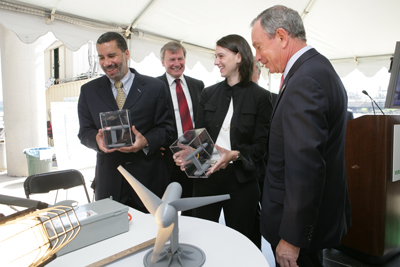
Mayor Michael R. Bloomberg has announced a plan to outfit municipal buildings with solar panels and to begin buying heating oil containing biofuels. He made this announcement shortly after turning on the switch for the Roosevelt Island Tidal Energy (RITE) project, a installation that will provide more than 1000kw hours per day of renewable electricity
Mayor Michael R. Bloomberg and Lieutenant Governor David A. Paterson today announced that Roosevelt Island Tidal Energy project has now generated and delivered the world’s first kinetic hydro-power to local businesses. Kinetic hydro-power is an emerging form of renewable energy derived from the natural flow of water, without the use of dams. RITE is using the first free-flow tidal turbines in the world, providing more than 1000kW hours per day of clean, emission-free electricity to Roosevelt Island. The turbines are operated by Verdant Power, Inc., a global integrator of kinetic or “free-flow” hydro-power systems and a leading marine renewable energy developer of dam-less hydro-power sites.
“Supporting innovative projects like Verdant’s is an important part of PlaNYC and will help us meet our goal of reducing New York City’s greenhouse gas emissions by 30% by the year 2030,” said Mayor Bloomberg. “In addition, today I’m announcing that the City is issuing an RFP for emissions free electricity from solar power generated on City owned buildings. This should send a message to the solar power industry: ‘We want your business.’ Because we expect our population to grow by nearly a million people between now and 2030, it’s important that we do everything we can to limit our impact on climate change, including supporting the development of more renewable energy sources. We hope that water turbines, solar panels, and other sources of renewable energy will will be the norm in the coming decades, but that will only happen if we support these technologies and industries today.”

The Mayor called for 2 mega watts of solar capacity for a pilot program aimed at creating long-term fixed price power for the City, and offsetting approximately 230 million tons of greenhouse gas emissions over the life of the contract. The city doesn’t want to buy solar systems instead they wish to have developers install them on city buildings and the city will then enter into a long term energy contract with the panel owners. This is very similar to what other big cities have done. The developer will install, own, finance, and maintain each solar power system, the city just buys the power.
The Verdant Roosevelt Island Tidal Energy (RITE) Project was initiated in 2002. After several years of research and development, it is now producing more than 1,000 kilowatt hours per day of clean, sustainable, emission-free electricity for Gristede’s Supermarket and the Roosevelt Island Operating Corporation (RIOC) “Motorgate” parking garage in New York City’s Roosevelt Island. The RITE Project’s second of three phases comprises 6 turbines-5 with 35 kW name plate generators and one equipped with a dynamometer for monitoring project operations. The RITE Project also has incorporated over $2 million in fish monitoring equipment. To date, there have been no detectable impacts on fish or the marine environment. At the site’s full capacity it could produce 10 MW, enough for 8,000 homes.
The Roosevelt Island Tidal Energy (RITE) project has already set a number of world precedents for energy delivery including:
* First kinetic hydro-power technology to deliver electricity to end-user customers
* First multi-turbine kinetic hydro-power field installed and operated
* First grid-connected multi-turbine kinetic hydro-power field installed and operated
* First fully bidirectional tidal operation
* Most hours of continual operation of any kinetic hydro-power technology
(40 days x 24hrs./day = 960 hours)
Bloomberg also announced a plan to use more biofuel in government buildings, saying that by next summer, 30 percent of the city’s heating oil purchases would be required to contain 5 percent biofuel. That percentage is to grow to 10 percent by 2010 and 20 percent by 2012. City Councilman David Yassky has plans to introduce legislation next week that would accelerate that timetable, with a 20 percent biofuel mix by 2011. For private buildings, including homes and offices, the legislation would mandate a 5 percent mix in 2009, increasing to a 20 percent mix by 2013.